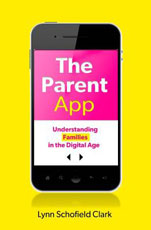Lynn Schofield Clark is Associate Professor in Media, Film, and Journalism Studies, and Director of the Estlow International Center for Journalism and New Media at the University of Denver. In this well-researched and presented book, she examines the benefits and drawbacks to children's use of the Internet, social media, mobile phones, and a host of other media. Clark's ten years of research on the ways in which parents are handling the changes to family life caused by digital technology is very interesting. Here are some startling statistics to keep in mind:
• 95 percent of kids have access to the Internet by age eleven.
• 89 percent of families have multiple mobile phones.
• 75 percent of 12- to 17-year-olds have their own phone.
• The average number of texts sent by a teen in a month is 3,000.
Throughout the book Clark makes the most of her training and skills as a sociologist who studies the media, as a communications scholar intrigued by the new possibilities for intimacy and interaction presented by this technology, and as a mother of two children.
The Parent App is divided into three sections with plenty of personal stories to carry the findings. Part One contains assessments of three dark sides of the Internet and mobile phones: cyberbullying, sexing, and Internet predators. Clark then turns to reports by teens and preteens on ways they use digital and mobile media to firm up their identifies and to relate to peers and their families.
The last section of the book deals with the author's findings on the ways different classes are affected by media saturation. The author discovers that among upper-income families, the digital world is seen by parents in a positive light as long as these technological toys are used by their children to advance their education and self-development. In lower-income families, the chief purpose of the media was to advance family solidarity and empowerment.
